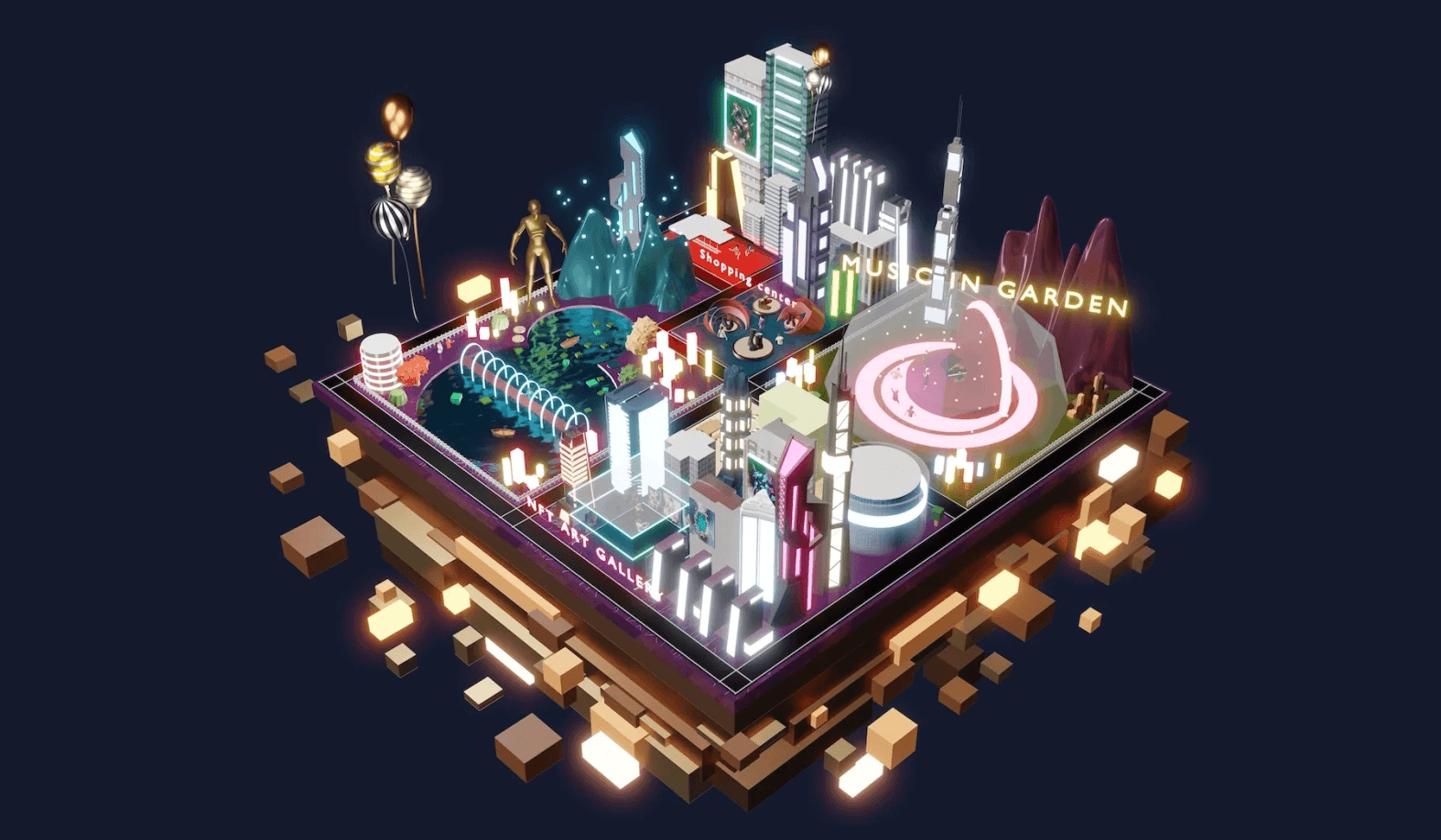Back to Blog
Companies in the metaverse: Unlocking new business opportunities
Apr 20, 2023
Martin Petkov
Big tech is betting on the metaverse, with investments in the space led by companies like Meta (formerly Facebook), NVIDIA, Roblox, Unity, and Epic Games. Several gaming companies, property developers, and consumer brands also buy digital real estate in the metaverse to make their presence known in this new world. The metaverse has created a variety of use cases for companies across sectors, which is why social media platforms, real estate companies, fashion brands, and education companies are establishing a presence. Companies that operate in the metaverse will benefit significantly from reaching broader markets, providing more immersive experiences, and cost-effectively scaling their business.
What big companies are investing in the metaverse?
Meta (formerly Facebook)
Facebook is one of the leaders in the metaverse and virtual reality (VR) space. The company rebranded to ‘Meta’ and is investing billions of dollars into building metaverse hardware and software. Meta’s CEO, Mark Zuckerberg, believes the metaverse is "the successor to the mobile internet, " driving their strategic focus in the space. Meta has its own VR worlds - Horizon Worlds, Horizon Venues, and Horizon Workroom, and it wishes to continue launching metaverse-related projects in the future.
NVIDIA
The tech giant NVIDIA is developing technology that will power the metaverse. Its core business focuses on producing hardware for graphics and chips to run high-intensity calculations to run metaverse projects. NVIDIA’s role in the metaverse will be crucial as the company aims to transform 3D graphics, making them more realistic. The company also recently announced a line of products it's working on to achieve this goal. For example, the Hopper chips and the Grace Graphic Processing Units (GPUs), alongside expanding its metaverse project called Omniverse.
Roblox
This online game, released in 2006, has grown into one of the leading metaverse platforms used by millions of users. A primary driver of the platform’s popularity is its focus on encouraging user-generated content (UGC) and allowing users to monetize their creations. As the platform continues to invest in metaverse infrastructure, it is now focused on providing experiences and giving users the tools they need to build virtual experiences.
Unity Gaming Services (UGS)
Unity is a global game development engine. It allows developers to create, scale, and monetize their games through their platform by offering tools specifically for the metaverse. It is used to build games for several platforms, including mobile, PCs, and AR/VR, an element of the metaverse. Game developers, however, are not the only users. Industrial clients also use the platform to build custom metaverses. The gaming company is also set to expand its tools for metaverse tailored for metaverse designing.
Epic Games
Epic Games owns several metaverse-based video games, including Fortnite and Unreal Engine. The company gained popularity long before blockchain games became mainstream by building a massive ecosystem and a platform with some of the most attended virtual events. The company continues to invest in the metaverse. It was recently involved in a $30 million funding round for Hadean, a metaverse infrastructure developer. Epic Games also acquired Sketchfab, a company that allows users to find, edit, buy, and sell 3D content to strengthen its position in the metaverse ecosystem.

Which companies are buying land in metaverse?
The metaverse is built up of digital property or land that exists as coordinates, representing a digital version of real estate. Several brands are now establishing a presence in the metaverse by purchasing virtual land and building experiences, events, and stores on top of it. Companies in gaming, property development, and consumer goods are already entering the space and growing fast.
Gaming
Gaming companies are native virtual space owners investing in metaverse virtual estate to build new user experiences.
Atari: To expand its gaming capabilities in the virtual world, Atari owns land in Decentraland and The Sandbox. With its own digital estate, the brand can build Atari-theme games and events that users can attend.
Property and real estate developers
Property developers are also entering the metaverse as blockchain and NFTs redefine virtual property ownership and create market opportunities for property sales and rentals. Some developers in the metaverse are:
MoveStreets: This British property listing firm purchased digital land in the metaverse to use it as a medium of viewing physical properties online.
Republic Realm: This land developer purchased land in The Sandbox for approximately $4.3 million from Atari, the largest transaction recorded in the space.
Consumer brands
Brands in fashion, sports, electronics, and food are also rapidly purchasing estate the metaverse to mark their presence and interact with younger consumers in a new way. Some consumer brands buying land in the metaverse are:
Nike: The leading sports apparel brand is buying digital plots of land to open retail stores and build consumer experiences.
Samsung: Electronics company Samsung bought land in Decentraland to launch its metaverse location designed to replicate its New York Samsung 837 store while offering immersive experiences.

LUSH House experience in Decentraland
What types of companies operate in the metaverse?
The metaverse has massive cross-industry appeal because of the potential use cases it offers for companies. Specific industries are thriving in the metaverse; we’ve listed down a few of them:
Gaming companies
One of the primary industries in the metaverse is gaming owing to the virtual world’s ability to build immersive and interactive experiences for players. The Metaverse is also built on the foundations of facilitating interactions with a single interoperable universe, making it ideal for gaming experiences. Games like Roblox, Fortnite, The Sandbox, and Axie Infinity thrive online. Axie Infinity alone attracted 3 million monthly users, proving its potential to succeed in the metaverse environment.
Social media platforms
The metaverse is built to be inherently social, making it a perfect space for audiences to communicate via digital representations of themselves through avatars. Meta (formerly Facebook), the leading social media platform, sees the metaverse as a platform that will redefine social interactions. The company is investing heavily in the space by leveraging virtual reality as a new medium to connect users.
Real estate companies
The metaverse comprises digital land plots and properties that must be developed to offer users an engaging virtual experience. These digital land parcels can become a profitable business opportunity for companies. Property developers and realtors do not need to be restricted to physical spaces to conduct their business - they can now showcase, buy or sell properties virtually. Guided tours of virtual properties can be offered without the hassle of traveling to sites, and estate tours can be personalized to a client’s preferences and tastes.
Fashion and luxury brands
High-end fashion brands have found a new avenue to engage, interact and sell to diverse demographics through the metaverse. Several brands like Gucci, Burberry, and Balenciaga are making a mark in the virtual world by building virtual storefronts and hosting virtual events. These activations are helping brands reach new audiences, personalize experiences and encourage user-generated content to make new connections with users.
Education and training companies
The applications for the education and e-learning space in the metaverse hold promise as the platform can create stimulating learning environments and experiences. VR technologies give learning a qualitative level similar to physical teaching, if not higher. Mesh, a mixed-reality platform built by Microsoft, allows lecturers, students, and staff to interact through virtual avatars to create the ideal learning environment. Individuals can access the platform to attend classes and conferences using a wearable. Immerse is another educational platform that teaches languages in the metaverse using VR.

Benefits of operating in the metaverse
Wider reach: The metaverse is not restricted by borders and can connect people globally. This is beneficial for companies looking to broaden their market reach. The media landscape is highly fragmented, meaning it is a task for companies to connect with their target audiences. However, with the metaverse’s population dominated by Gen Z, it creates a new channel to reach them.
Immersive experiences: The metaverse opens up a new range of possibilities to create entertaining content for users through immersive experiences. Companies can create games, virtual stores, events, and much more through the power of augmented reality (AR) and VR in the metaverse. These experiences can help companies and brands engage their customers and clients and leave a long-lasting impression on them.
Virtual events: Interactive and live events in the metaverse can help attendees worldwide feel more connected and present at a location. Events like exhibitions, concerts, fashion shows, galleries, and museums are gaining popularity in the metaverse and are a great way to bring audiences together while achieving marketing and sales goals. For example, an NFT avatar exhibition recently held sold an impressive 300 avatars, as reported by Appinventiv.
Cost-effectiveness: Building large-scale experiences through events or stores is much more cost-effective in the metaverse than doing the same in the physical world. The rent and cost of utilities can be much more affordable for the level of exposure they can give a company.
New real estate opportunities: Land in the metaverse is developing quickly and has become an excellent way for individuals to invest in digital real estate and earn a handsome return on investment. These properties can be bought, rented, or sold, opening new business opportunities for realtors and property owners.
Conclusion
Brands like Atari, Nike, and Samsung are investing in virtual land in the metaverse to build experiences, events, and stores on top of it. The metaverse has created a cross-industry appeal with organizations in gaming, social media, real estate, education, and the luxury brand market growing operations within the space. Companies and brands that build themselves in the metaverse can reach new demographics, build memorable experiences, host immersive events, and gain income through virtual real estate trading.
Are you a company looking to establish yourself in the metaverse? We will help you create a presence in the metaverse by building, scaling, and monetizing your idea. Get in touch with us!
Apr 20, 2023
Martin Petkov
Subscribe to our monthly newsletter
About Landvault
Landvault is building infrastructure to accelerate the metaverse economy, by building tools to create, deploy and monetize content. The company has helped over 200 clients enter the metaverse, including both Fortune 500 companies and government organizations like the Abu Dhabi government, Mastercard, L’Oreal, Red Bull, and Heineken. The company has raised a total of $40m over the past three years and continues to pioneer technological advancements.
